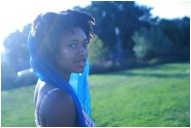 Nijla Mu’min is a writer and filmmaker currently attending CalArts graduate Writing and Film Directing Programs. Much of her work is concerned with subverting ideas of the “politicized” body. Within that scope, she explores familial relationships, silence, sexuality, and duality in black women. All of these issues converge in her feature script Salaam, which centers on a Black, Muslim girl named Sabaa who navigates sexuality, popular culture, and teen-girl folklore in a search for self-definition. Her writing and film work can be viewed at: http://sweetpotatopieproductions.com/. Her short film, Two Bodies will be screened in the upcoming Pan African Film Festival.
Nijla Mu’min is a writer and filmmaker currently attending CalArts graduate Writing and Film Directing Programs. Much of her work is concerned with subverting ideas of the “politicized” body. Within that scope, she explores familial relationships, silence, sexuality, and duality in black women. All of these issues converge in her feature script Salaam, which centers on a Black, Muslim girl named Sabaa who navigates sexuality, popular culture, and teen-girl folklore in a search for self-definition. Her writing and film work can be viewed at: http://sweetpotatopieproductions.com/. Her short film, Two Bodies will be screened in the upcoming Pan African Film Festival.
An excerpt from Nijla’s story, “Wild Wind”:
“As the car rolled through familiar San Francisco terrain, I could offer no more than halfway nods and smiles that masked my discomfort. How could I convey to Theo that while I respected his religious beliefs, I still had my own? How could I let him know, without seeming apathetic, that I wasn’t overly religious? Upon hearing his proclamation that he needed to find a wife to support him in his aspirations to become a preacher, I couldn’t help but let out a confused, but genuine, laugh. The absurdity of the [date] had become funny.”
To read the rest of Nijla’s story, order Love, InshAllah today!
Why were you drawn to this project?
I’d grown up going to a masjid where some women wore scarves and some did not. I learned that Muslim people couldn’t “date,” but I still wanted to. My sister and I were big fans of the singer Aaliyah and I remember my sister dressing like her, with her stomach out. When I found out about this project, I started to revisit some of my earliest understandings of Islam, juxtaposed with early understandings of my body, of how I should interact with boys, and a lot of those messages came from outside of the religion, from music, popular culture, from friends, causing both confusion and depth. I wanted the worlds I navigated to become more fluid and I was drawn to the project because I could explore those worlds, particularly from the intimate lens of romance, where many of those issues come to a head.
What was the most challenging part of sharing your story?
It’s always hard to write about things you don’t fully understand yourself. I feel like there’s always a push to categorize and commodity things and people, to adhere to limiting binaries in order to be easily digestible or understood. But my identity, my upbringing, and my attempts at romantic relationships have been anything but that. The idea of being a “Muslim woman” was never so fixed for me and at times I found it difficult to sum up my experiences with Islam, and its influence on my life and relationships. Writing this story helped me to explore the difficulty of my duality. As I wrote, I discovered things that I didn’t know when I began. I think that’s the beauty of writing. In a sense, I was writing to understand myself.
If there’s one thing you hope that readers will take away from your story, what is it?
Recently, I mentioned this book to a fellow Muslim who replied: “Well Muslim women aren’t even supposed to be having relationships.” I am intrigued by the complications and complexity that exists outside of this statement and beliefs like it. What about the Muslim women who have formed relationships? What happens when we acknowledge the humanity of Muslim women, and not the “idea” of a Muslim woman? I would hope that my story encourages readers to ask these questions and interrogate problematic definitions of how Muslim women, and people, walk through this world, be it romantically, politically, or otherwise.











